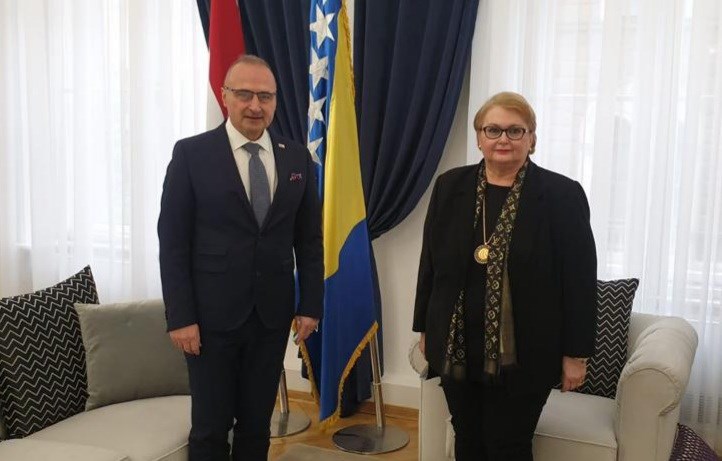


Croatian Foreign and European Affairs Minister Gordan Grlić Radman and Bosnia and Herzegovina's Foreign Minister Bisera Turković agreed in Sarajevo on Wednesday to strengthen the cooperation between the two countries and gradually address outstanding issues.
They also underscored that good neighbourly relations had no alternative.
Grlić Radman met with Turković during his official visit to Bosnia and Herzegovina, and the meeting lasted twice as long as planned, which both ministers said was proof of how successful it had been.
Grlić Radman said there was no doubt that Croatia was Bosnia and Herzegovina's friend and that it would continue to be that way.
He said that the decision of the Croatian government to donate coronavirus vaccines to Bosnia and Herzegovina was proof of that, as they wanted to show solidarity with the needs of its citizens in that way.
"We will deliver that vaccine soon," Grlić Radman announced the donation, and the exact quantities of doses will be determined later.
Grlić Radman reiterated the support for the integrity of Bosnia and Herzegovina as a state of three constituent peoples and all citizens, saying that Croatia remained a strong advocate of the country's Euro-Atlantic path and adding that that was why he had presented the Croatian initiative to the EU Foreign Affairs Council, which aimed to help Bosnia and Herzegovina to gain candidate status for membership in the Union.
"The non-paper explains this initiative, and I explained to Minister Turković what it was about," Grlić Radman said, rejecting the claims of reporters from Bosnia and Herzegovina that Croatia was trying to interfere in the country's internal affairs in any way. He said that Croatia's non-paper only served to strengthen Bosnia and Herzegovina.
Answering reporters' questions, he said that there was no evidence of there being a "phantom" non-paper from Slovenia, which allegedly advocated the division of Bosnia and Herzegovina.
Minister Turković said that it was clear that Slovenia had denied the existence of the alleged non-paper. "For now, I would consider the paper non-existent or a frivolous attempt to cause confusion," Turković said.
She expressed satisfaction that she "managed to analyse and say everything necessary" with Grlić Radman, adding that she believed that they had agreed on compromise formulas for resolving outstanding issues and further strengthening interstate relations.
She said they had proposed new ways of cooperation in the fight against the pandemic, including vaccination and easing conditions for crossing the border with Croatia for citizens of Bosnia and Herzegovina, especially during the summer season.
They also clarified the issue of the possible construction of a radioactive waste landfill on Trgovska Gora, which will be discussed by expert working groups in the future, and Croatia's Foreign Minister explained there was nothing illegal in the construction of a gas pipeline from Croatia to the Bosanski Brod oil refinery.
Ahead of the talks with Turković, Grlić Radman met with the international community's High Representative Valentin Inzko, who underlined that Bosnia and Herzegovina had many friends, but that they couldn’t solve its problems as that’s the task of its politicians.
Inzko thanked Grlić Radman for “all the constructive steps Croatia has taken in regards to Bosnia and Herzegovina’s journey of European integration”.
Grlić Radman also met with RCC Secretary General Majlinda Bregu and visited the Islamic Community, where he held talks with its Raisu-l-Ulama Husein Kavazović. The minister also paid a visit to the Archdiocesan Chancery, where he met with Archbishop of Vrhbosna Vinko Puljić.
Text: Hina/MFEA